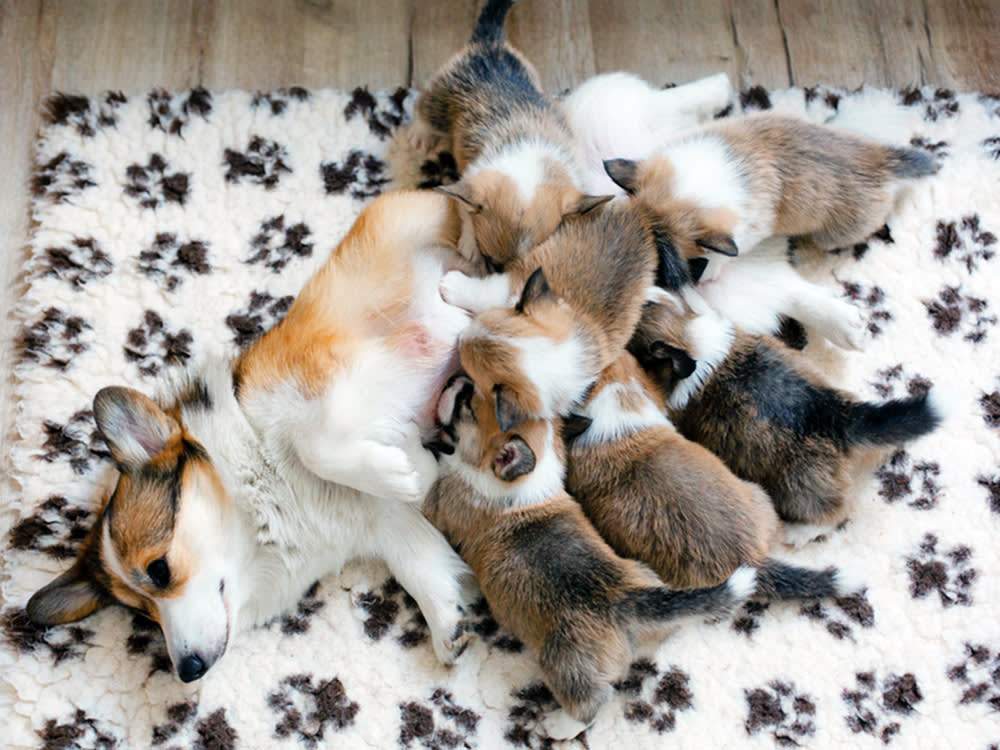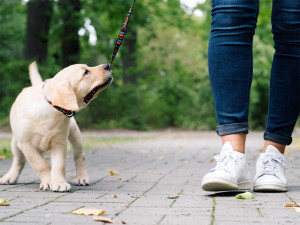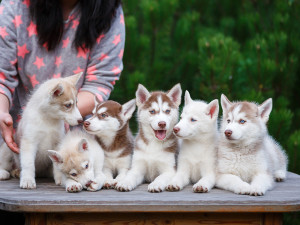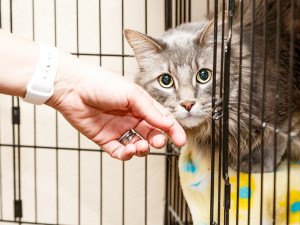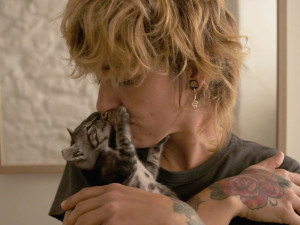Why You Shouldn’t Adopt a Pet From Social Media or Buying/Selling Sites
It’s not quite the same as buying secondhand clothes…
So you’ve decided you want to adopt a pet – amazing news, welcome to the pet parent club! But where should you adopt your pet from? With rescue centres like the RSPCA seeing a six percent increaseopens in new tab in the number of dogs being taken into care and a four percent increase in cats between 2021 and 2022, adopting a pet from a rehoming charity is always the responsible and smart choice. If you have your heart set on a specific breed – particularly one that doesn’t typically end up in rescue centres, consider breed-specific rescuesopens in new tab.
One problem with breeding or adopting pets online is that it is very much a business for many people, with the average price of a pedigree puppyopens in new tab in the UK sitting at a whopping £1,382 and pedigree cats being soldopens in new tab for anything from £200 to over £1,000. This means you can risk getting into business with the wrong people, which includes straight-up scammers: during the 2020 pandemic-puppy craze, for example, pet-scam complaints tripledopens in new tab from the year before, and many of these were a result of prospective pet parents adopting animals from people online.
There are also puppy mills, aka breeders who pump out as many litters as possible to make as much money as possible. And then there are ‘backyard breeders’ who either don’t know what they’re doing, don’t take great care of their dogs or cats, or pretend to be legit and reputable when they’re not – or in many cases, all of the above.
That’s not to say that there aren’t plenty of great, trustworthy breeders out there – The Kennel Club has a section on their websiteopens in new tab that allows you to search for Assured Breeders, and for cats, Registered Catsopens in new tab has a list of registered pedigree cat breeders in the UK – but the one avenue you absolutely shouldn’t go down to adopt a pet is via social media or buying/selling sites.
Local community social media pages and buying/selling sites are often filled with posts of people looking to rehome dogs, cats, puppies and kittens, often accompanied by heart-wrenching stories that emotionally manipulate well-meaning future pet parents into thinking that they should rescue and rehome this poor unwanted pet or new puppies/kittens, but a responsible pet owner who can no longer look after their pet or whose pet has unexpectedly fallen pregnant should be placing these animals in a rescue centre, not trying to sell them online. Adopting your future cat or dog from a random person online is a huge risk that should not be taken lightly. We take a look into the reasons why.
Lack of regulation
When you buy a pet from a reputable breeder or adopt from a rescue centre, you have some assurance that certain standards and regulations have been followed. “Breeders typically adhere to guidelines set by official breeding associations, ensuring that animals are bred responsibly and ethically, and rescue centres are often subject to regulations regarding animal welfare and care,” explains trainee veterinary nurse Becky Wakefield.
However, individuals selling pets on social media or classified ad sites are not held to the same standards. “There is no guarantee that the animals they are selling have received proper care, vaccinations, veterinary attention or even adequate nutrition,” says Becky. Without regulation, future pet parents have no way of verifying the conditions in which the animals were bred or raised, increasing the risk of purchasing a pet with health or behavioural issues.
Potential scams
“Scammers are increasingly exploiting the popularity of online platforms to deceive unsuspecting future pet parents,” says Becky. They create fake listings using stolen photos or descriptions, enticing individuals with promises of adorable pets at unrealistically low prices. Once a buyer shows interest, the scammer may request payment upfront, often through untraceable methods such as cryptocurrency. However, after receiving the payment, the seller disappears, leaving the buyer without their pet and out of pocket.
Health and behavioural risks
“Pets purchased online may come with undisclosed health issues or behavioural problems, which can manifest days, weeks, or even months after bringing them home,” says Becky. “Without proper veterinary care and socialisation during crucial developmental stages, these animals may suffer from infectious diseases, genetic disorders or behavioural issues stemming from neglect or trauma.” Addressing these issues can be emotionally and financially draining for pet parents, who may find themselves unprepared for the challenges associated with caring for a sick or traumatised animal.
Supporting irresponsible breeding
Irresponsible breeding practices also contribute to the proliferation of genetic disorders, overpopulation and the mistreatment of animals. “Adopting pets from sellers who prioritise profit over the well-being of the animals can result in well-meaning pet parents inadvertently perpetuating these harmful practices,” explains Becky.
Puppy mills, for example, are notorious for subjecting breeding dogs to awful living conditions and health issues, all in the pursuit of maximising profits. Similarly, backyard breeders may lack the knowledge or resources to properly care for their animals, resulting in substandard living conditions and inadequate veterinary care.
Ethical concerns
“Animals sold through social media or buying/selling sites may have been sourced from dubious origins, including puppy mills, illegal breeding operations, or even stolen from their rightful owners,” says Becky. By engaging in transactions without proper background checks or verification of the seller’s practices, pet parents risk perpetuating the cycle of animal exploitation and suffering. “Plus, supporting sellers who prioritise profit over the welfare of the animals undermines efforts to promote responsible pet ownership and combat animal cruelty,” says Becky.
Lack of support and accountability
Reputable breeders and rehoming charities typically provide ongoing support and guidance to pet parents, ensuring that they have the resources and assistance needed to care for their animals. However, sellers on social media or buying/selling sites may offer limited or nonexistent support after the sale. “This lack of accountability can leave pet owners feeling isolated and overwhelmed, especially if they encounter unforeseen challenges or difficulties in caring for their new companion,” says Becky.
What are the red flags to look out for?
So how do you find a reputable breeder and how do you distinguish a scam? There are a few red flags you can look out for.
They’re advertising the animals on social media or buying/selling sites
This is the number one red flag! Anyone trying to sell animals via social media posts or listings on buying/selling sites is unlikely to be a registered breeder, and the same goes for people who have elaborate websites. Most reputable breeders rely on prospective pet parents finding them through official databases or reliable word-of-mouth.
They don’t know much about the breed
“Good breeders are a resource base, a wealth of knowledge about their breed,” says Brandi Hunter Munden, the vice president of public relations and communications at the American Kennel Clubopens in new tab. Potential pet parents should be able to ask them a thousand questions about everything from their energy level to common health conditions to how good they are with kids and other cats and dogs. And they will never get annoyed. “A reputable breeder wants you to know every single possible thing about the breed so that their animals never end up in a shelter,” says Brandi.
If you encounter a breeder who isn’t forthcoming about the inner workings of the breed, tells prospective pet parents to do their own research, or gets irritated by their questions, stay away.
They don’t quiz you
“Buying a pet should involve an interview where the breeder asks you a bunch of questions about your lifestyle, goals for you and your pet, your home environment and more,” says Brandi. And they will turn someone down if they believe they aren’t the right fit.
“A good breeder cares more about their animals having the best life possible than they do about making money off of them.” So, if it seems the purchase process could happen rather seamlessly and without questions, take that as a sign that the person is, at worst, a scammer, and at best, not invested in the animals’ futures.
They’re willing to sell the animal too early
The Dogs Trust recommendsopens in new tab that puppies be at least eight weeks old when they’re adopted. If anyone tries to sell a puppy at six or seven weeks old, definitely question their integrity. Meanwhile, Cats Protection recommendsopens in new tab adopting kittens no earlier than eight to 10 weeks.
They won’t communicate on the phone
Reputable breeders want to make sure the future pet parents are legit, too, so they’ll call, text or video call them – whatever it takes to get a sense of who they are and to start building a relationship with a prospective parent. Brandi adds that anyone who won’t get on the phone with a potential parent is someone they shouldn’t work with.
They have a ton of puppies or kittens available at once
It’s certainly possible for a legitimate and reputable breeder to have multiple litters ready at once because female dogs who live together are likely to go into heat around the same timeopens in new tab. That said, most respectable breeders will have only a few litters per calendar year so they can keep their breeding dogs as healthy as possible.
There’s no hard-and-fast rule about how many litters is too many litters, but Brandi says seeing a waiting list (as frustrating as it may be) is a good sign that the breeder is doing things right and is not in it for the money.
They don’t appear on official databases
Being recognised by The Kennel Club is typically a sign of a reputable dog breeder but make sure you do your research if they’re making this claim. The Kennel Club has a section on their websiteopens in new tab that allows you to search for Assured Breeders. For cats, Registered Catsopens in new tab has a list of registered pedigree cat breeders in the UK.
They don’t do health testing
In England and Wales, puppy breeders should comply with the ‘Fit to Breed’ assessmentopens in new tab, which is carried out by a vet, and trustworthy breeders will share the paperwork proof with potential parents. If the breeder sounds at all sketchy about providing proof or tells a potential pet parent that the testing is a cost they need to cover, that’s a red flag. For one, their dogs could have undisclosed health problems, and two, if they skipped recommended tests, they likely didn’t work with a vet to ensure they bred in the safest way for their dogs.
Cat breeding is currently unregulatedopens in new tab in the UK but there’s lots of helpful information available on The Governing Council of the Cat Fancy’s websiteopens in new tab, which is the UK’s ‘premier cat registration body’.
So while this can all seem like a bit of an overwhelming minefield, the bottom line is to have your wits about you and do as much research as possible into the person you are planning to adopt your cat or dog from – the safest route for both you and your future pet is always to adopt from a rescue centre.
